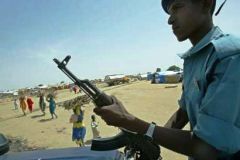Sudanese army attacks Darfur civilians – African Union
Oct 1, 2005 (KHARTOUM) — The African Union (AU) accused the Sudanese government on Saturday of coordinating with Arab militias in attacks on civilians in Darfur, and said all parties to the conflict were violating ceasefire agreements.

|
|
A Sudanese policeman secures the Kalma camp near Nyala. (AFP) . |
Despite AU-sponsored peace talks in Nigeria and the ceasefire, violence has spiralled in the region over the past two weeks as rebel forces attacked a government garrison and Arab militias, known as Janjaweed, rampaged through a refugee camp, killing at least 32, the AU said.
“We must conclude that there is neither good faith nor commitment on the part of any of the parties,” Baba Gana Kingibe, head of the AU mission in Sudan, told reporters in Khartoum.
About the Janjaweed attacks on villages and refugee camps in Darfur, he said government helicopters had been seen flying in the area at the time of at least one of the attacks.
“This apparent land and air assault gives credence to the repeated claim by the rebel movements of collusion between the government of Sudan (GOS) forces and the Janjaweed,” he said.
Mostly non-Arab rebels took up arms against the government in early 2003 accusing them of neglect and of monopolising power and wealth. The United Nations says Khartoum responded by arming Janjaweed, who stand accused of a widespread campaign of rape, killing and burning in non-Arab villages.
The violence, described as genocide by the United States, has killed tens of thousands and forced more than 2 million from their homes to camps in the vast region the size of France.
Khartoum admits arming and absorbing some tribes into regular armed forces, but denies any links to the Janjaweed, calling them criminals.
Kingibe also said government forces had “considerable and known” influence over the Arab militia and had ceased to restrain them in recent days as they had been doing in the past.
He said humanitarian workers had been forced to take shelter near AU camps during government attacks, and the upsurge in violence had hindered the humanitarian operations in the region.
“We expect a greater sense of responsibility … on the part of the GOS troops and their allies than they have exhibited in the last four days,” Kingibe said. He added even if the attacks were retaliation for rebel attacks, the government had used disproportionate force and targeted innocent civilians.
(Reuters)
